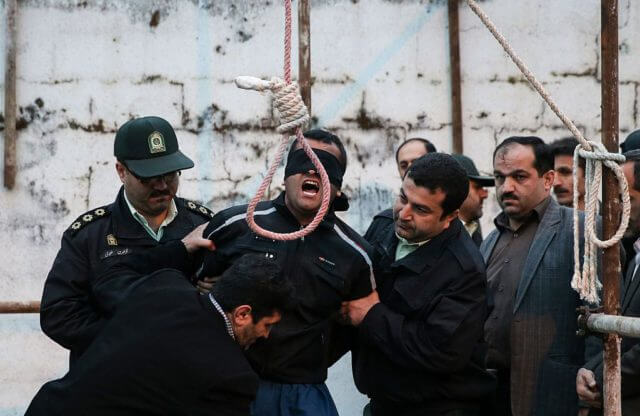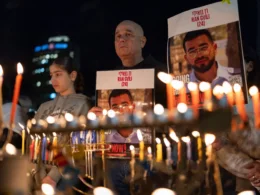As demonstrators continue to protest the current state of Iran under the Islamic Republic, new reports indicate that the regime has increased its executions over the past few years, months, and weeks against ordinary citizens, minorities, and religious groups who have spoken out against the government.
According to leaked records from Iran's prisons, over 5,370 individuals are on death row for trumped-up charges, including drinking alcohol, criticizing the government and Islamic law, or mocking Iranian Supreme Leader Ali Khamenei. The latest set of executions and leaks from Iranian human rights groups, journalists, and individuals inside Iranian prisoners comes as the regime's security forces arrest protesters throughout the country, leading to the concern that the Islamic government will unleash another round of mass executions.
According to the newly obtained classified documents, over the past years and months, around 50 individuals have faced stoning deaths, and some 3,000 prisoners have had their eyes gouged out, hands chopped off, and public hangings on cranes. Friends and family members of individuals in Iranian prisoners have been encouraged to participate in the executions themselves under Islamic Law. The report outlines how Iranian authorities inside the prisons have flogged prisoners and conducted amputations in front of prisoners.
"There are many factors which explain the increase of executions, most especially the regime being under siege economically and politically and seeking to frighten the Iranian public into submission in response," according to Jason M. Brodsky, policy director at United Against Nuclear Iran (UANI).
"The increase in executions also coincides with the ascension of Gholamhossein Mohseni-Ejei as chief justice in 2021, who is notorious for repressing the Iranian people as a former intelligence minister.” Jason explains that Iran's current system has "become more consolidated, with Iran's supreme leader narrowing the political field ahead of succession, resulting in policy outcomes like increased death sentences.”
Many of the prisoners must face sadistic guards who use electrical shocks, floggings, waterboarding, sexual violence, and other brutal tactics to obtain information from prisoners and whether they are in league with outside foreign groups. Additionally, guards have pointed guns at prisoners' heads to threaten them into submission and used physical force against those who have resisted interrogation, leading to massive head trauma and bloody injuries for many victims.
In recent weeks, the Islamic Republic has continued its horrific executions by sentencing 12 Baluch minorities to death in the Zahedan Central Prison. According to the Norway-based Iran Human Rights (IHR) group, the individuals included 11 men and one woman convicted on drug-related and murder charges and died on Monday morning by hanging. The group of individuals was just one of many ethnic and religious minorities that the Shiite Islamic government has crackdown on in the past few months to rid the country of individuals considered non-Islamic.
According to Cameron Khansarinia, policy director at the National Union for Democracy in Iran (NUFDI), “one of the central stories of the Iranian national epic, the Shahnameh, is that of Zahhak a non—Iranian dictator who takes power in the country and everyday kills two young people to support his existence. That is why Iranians call Ali Khamenei ‘Zahhak-e Zamaneh’ or the Zahhak of our Times. That is exactly what he is because he is murdering Iran’s youth to support his regime’s existence. So no, I am not surprised Ali Khamenei is murdering more Iranians.”
The Supreme Leader will “continue to execute more Iranians as long as he is in power, and especially as long as spineless leaders in the West refuse to even condemn his crimes against humanity. We have pleaded with the Biden administration, so have others, to pay attention. They clearly do not care,” exclaims Khansarinia.
As the country now faces protests in Tehran, Isfahan, Ahvaz, and many other areas throughout the country, the regime's security forces have used violent force against unarmed protesters and placed many under arrest using unfound charges.
Supreme Leader Ayatollah Ali Khamenei has accused the West of supporting the protests, arguing that the enemies of the Islamic Republic want to see the regime overthrown.
Brodsky believes that the international community needs to "impose tangible consequences on the Iranian leadership for these practices. Dialogue has not influenced Tehran on these files. Sanctions and diplomatic isolation--especially when it is multilateral--impose costs and in some cases have resulted in the Islamic Republic postponing death sentences.”
"The United States has been imposing human rights-related sanctions on the Iranian regime. But Europe sadly, except for once last year, has refrained from doing so because of its desire to save the Iran nuclear deal even though human rights-related sanctions do not violate its terms. The European Union and the United Kingdom, therefore, need to do more," explained Brodsky.
The Islamic Republic of Iran's history of massive brutal executions is nothing new, given the regime's past from 1979 to today. After deposing the former Iranian monarchy, Ayatollah Ruhollah Khomeini and his radical Shiite followers immediately engaged in mass executions against former Iranian military generals, friends of the former monarchy, minority groups, non-Muslims, and other groups, using firing squads and hanging by cranes. Over the years, the regime has built a feared police state, using numerous prisons to hang and kill many Iranians who have called for the overthrow of the regime.
During the Trump Administration, then-Secretary of State Mike Pompeo brought to light the number of executions occurring at the hand of the Islamic Republic, enacting economic sanctions against the Islamic Republic, and targeting regime officials known to have a critical role in the massive killings. Under the Biden administration, Secretary of State Antony Blinken and State Department officials have condemned the regime's executions and called on the Islamic Republic to release prisoners but have stopped short on sanctioning the mullahs, given that the President is hoping to revive the 2015 nuclear agreement with Tehran.









